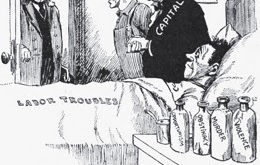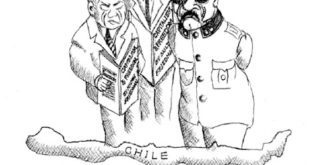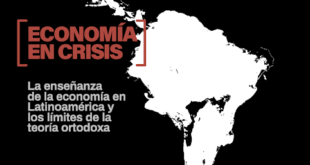[embedded content] Podcast with about the never ending crisis in Argentina with Fabián Amico, and myself and interview by Carlos Pinkusfeld Bastos and Caio Bellandi from the Lado B do Rio Revista, and sponsored by the Centro Celso Furtado (Carlos is the director). In Portuguese (but fine if you speak Spanish or at least Portuñol).
Read More »Trumponomics vs. Bidenomics: The good, the bad and the stupid
The debate between Biden and Trump is on everybody's mind. And for good reason, the future of the global economy, and the well being of the planet are always at stake in American elections. I, of course, will restrict my brief comments here to the economy, and what the alternatives might entail. But the analysis of the impacts of both programs, if one can talk of programs per se, is very poor, to say the least.Broadly speaking there has been increasing agreement on a tougher policy with...
Read More »Debt cycles and the long term crisis of neoliberalism
[embedded content] My talk at the IDEAS/PERI conference a few weeks ago. As I said there, I hate to be the optimist in the room, but I'm a bit more skeptical about the risks of a generalized sovereign debt crisis in the Global South. The two papers I cite are these (in their PERI Working Paper versions) two (one and two).
Read More »Keynes’ denial of conflict: a reply to Professor Heise’s critique
Tom Palley reply to response about his paper on Keynes lack of understanding of class conflict. In many ways, this is how Tom discusses Keynes lack of understanding of old classical political economy. Tom is correct in pointing out that:"Kalecki (1933 [1971]) began the process of incorporating conflict into the Keynesian paradigm, but there is much more to be done regarding recognizing conflicts’ implications for economic theory and recognizing the multiple fora in which it appears."Of...
Read More »Podcast Failures: Friedman and Chile, Hume and Public Debt
I listen to a few podcasts during my commute. Two that I often appreciate are Know Your Enemy, associated with Dissent Magazine,* a series of interviews on mostly right wingers by Matthew Sitman and Sam Adler-Bell, and Past, Present and Future, a series of monologues by David Runciman, sponsored by the London Review of Books. Both are always entertaining and informative. I'm not a specialist in most of the subjects they discuss. However, two recent episodes (or at least I listened to them...
Read More »Labor And Land Are No Commodities
I read Karl Polanyi's The Great Transformation: The Political and Economic Origins of our Time years ago. I find its thesis on the first passage of the first chapter: "Nineteenth-century civilization rested on four institutions. The first was the balance-of-power system which for a century prevented the occurrence of any long and devastating war between the Great Powers. The second was the international gold standard which symbolized a unique organization of world economy. The third was...
Read More »The menace of the myth of General Pinochet’s Chilean economic miracle
By Thomas PalleySeptember 11, 2023, marks the fiftieth anniversary of General Pinochet’s military coup against Chilean President Salvador Allende. While it is now widely recognized that Pinochet authorized large-scale human rights abuses, there is an accompanying narrative that he also unleashed an economic miracle via embrace of Milton Friedman’s “Chicago Boys” vision of a market economy.The “Pinochet economic miracle” narrative is profoundly misleading. Worse yet, it is a political menace...
Read More »The problem with Keynes’ General Theory: by Tom Palley
New working paper by Tom Palley. From the abstract:Keynes' General Theory was a massive step forward relative to classical economics, but it was also a step backward in its denial of the conflictual nature of capitalism. There is need to understand Keynes' technical contributions regarding the workings of monetary economies, but also need to understand the flaws within his thinking and the consequences thereof. Keynes made a fundamental contribution elucidating the mechanism of effective...
Read More »New book on the crisis of economics and teaching in Latin America
The book (in Spanish) titled "Economía en crisis : la enseñanza de la economía en Latinoamérica y los límites de la teoría ortodoxa" [Economy in Crisis: The teaching of economics in Latin America and the limits of orthodox theory] is edited Andrés Jose Maria Lambertini; Ignacio Silva Neira. The introductory chapter on the role of neoliberalism and its resilience in the region is by Esteban Pérez and myself. There's a webinar with Carolina Alves and Gabriel Porcile, besides the editors.It...
Read More »What is heterodox economics? Some clarifications
Long ago I wrote on the meaning of heterodox economics. I suggested that it should be defined in its own terms, not as a reaction to the mainstream or orthodox approach, and as a unified set of propositions.[1] In other words, heterodox economics would be a set of principles that would be backed by a certain community. Of course, the sociology of that community would lead to some degree of debate and dissent within heterodoxy, as it is in fact the case within the mainstream. There is, one...
Read More » Heterodox
Heterodox





